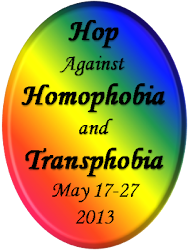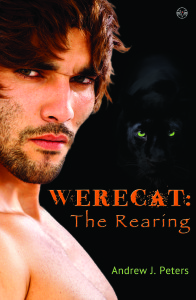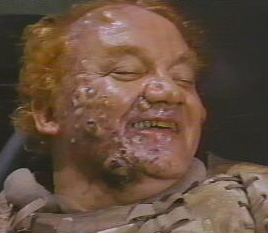UPDATED MAY 27TH: I have a winner! Selected through Random.org, and proving that coming late to the party is no handicap, Peggy has won the drawing for Werecat: The Rearing. I will be in contact with her very soon to provide her with the e-Book.
A million thanks to each of you who stopped by. This was my first blog hop, and I have definitely caught the bug; so there will be more giveaways on the horizon. 🙂
~
 I’m participating in this year’s Hop to raise awareness of the International Day Against Homophobia and Transphobia. The Hop was organized by authors of gay romance around the globe, in order to: “stand as a writer community against discrimination of our works.”
I’m participating in this year’s Hop to raise awareness of the International Day Against Homophobia and Transphobia. The Hop was organized by authors of gay romance around the globe, in order to: “stand as a writer community against discrimination of our works.”
As a promotion for this event, I’m giving away a free copy of my upcoming (May 28th release) e-novelette Werecat: The Rearing. For a chance to win a copy, read this short post and drop a comment below. I will randomly select a winner on May 28th and send her or him the e-book (Kindle, Nook, MOBI and pdf formats available).
Here’s the back cover blurb for Werecat:
For Jacks Dowd, a gay college senior who feels ungrounded from his family and life in general, an alcohol and sex-infused weekend in Montréal sounds like a pretty good escape. His Spring Break binge takes a detour when he meets Benoit, an admiring drifter with startling green eyes. A hook-up turns into a day, two days, and then a full week in Benoit’s hostel, making love and scarfing down take-out food. But at the end of the week, Benoit demands that Jacks make an impossible choice: stay with him forever or never see him again.
The night before Jacks is supposed to return to college, he meets Benoit in Mont Royal Park to try to work things out. Benoit springs on Jacks an unfathomable secret: he’s a werecat. He traps Jacks in an abandoned cabin and performs an occult rite so they will be mated forever.
With his dual nature, Jacks can shape-shift at will, and he has amazing new senses and physical abilities. But how will he live as an unfathomable hybrid creature? When Benoit shows Jacks the violence he’s capable of, Jacks may need to find a way to destroy the one person who can help him survive.
Now, my thoughts on homophobia and transphobia…
The extent of anti-LGBT discrimination in the literary community is a frequent topic of discussion among the LGBT writers I know. Most of us would say that some degree of bias exists. Why should the literary community be different from any other?
The impetus for the Hop, back in 2012, was the discriminatory practices of the Oklahoma Chapter of the Romance Writers of America (RWA), who hosted a writers’ contest with the stipulation that stories featuring male/male couples would not be considered.
Notwithstanding that ugly incident (which resulted in the chapter cancelling their contest altogether), I think LGBT discrimination in the literary community, as in other arenas, has generally moved from overt, sanctioned forms to de facto, more subtle practices.
For example, when readers and writers point out that there are too few LGBT-themed books getting published and/or those books don’t receive the attention — marketing-wise and media-wise — that they deserve, the typical response is that it’s a problem of supply and demand. The LGBT market is smaller. There are fewer people who want to read those books.
That’s still discrimination. Regardless of the forces at work, writers of LGBT stories have a steeper mountain to climb to reach readers. Readers of LGBT stories have fewer choices and have to put more time and effort into finding the literature they like. Of course, small presses and self-publishing have widened the access point significantly. But for the mass market — the featured titles at the big on-line booksellers, and the type of books anyone can find at the newstand/bookstores at the airport — books with LGBT content remain seriously underrepresented.
I think it’s a problem of an entrenched mindset. When people believe there’s a limited market for LGBT stories, it becomes a self-fulfilling prophecy. LGBT stories get marginally published, they make marginal profits, and the publishing gatekeepers say: see, I told you so!
See also: racism in publishing, sexism in publishing, ableism in publishing, etc.
Some people have asked me if I ever experienced discrimination as a gay author who writes gay stories. My answer is a bit nuanced. I’ve never received feedback from an editor or an agent that I would characterize as discriminatory. I’ve also never of course been a fly on the wall when editors or agents were discussing my work. The big publishing houses haven’t been interested in my work so far, but there are so many factors there that invoking homophobia would be a pretty unreliable conjecture.
What I have experienced is strange comments from non-LGBT writers that I think reflect a lack of understanding, and — dare I say — heterosexism.
“Why do all the bad things in your story have to happen to gay people?”
“I think your story would work better if there was a more positive portrayal of gay people.”
Here’s the context: in most of the stories I write, the main characters are gay. So when drama happens — good or bad — it’s going to happen to someone gay. Sorry, no handling of minority characters with kit gloves.
What I like to say when I get those reactions is: when you read a non-LGBT novel, say The House of Sand and Fog, does it concern you that all the bad things happen to non-LGBT people? Or that the story portrays non-LGBTs as damaged, desperate, or immoral?
Of course not, because non-LGBT characters have the privilege of being received as multi-faceted, villains or heroes, villains and heroes at the same time even, without being called up as a reflection of all non-LGBT people.
See also: racism in the media, sexism in the media, ableism in the media, etc.
I think there’s still much work to be done regarding public attitudes and perceptions of LGBTs. And the funny thing is that there’s a two-way feedback loop between public attitudes and literature — which I’ll include under the umbrella term “media.” Public attitudes can change the media. I would venture to say that a book like David Levithan’s Two Boys Kissing would never have been mass published ten years ago when public opinion polls showed that less than half of the general public believed that LGBTs deserved basic human rights like the right to marry. On the other hand, media can change public attitudes. When J.K. Rowling announced that she had always imagined that her beloved character Dumbledore from the Harry Potter series was gay, it had a huge impact on attitudes and perceptions of LGBTs (too bad Rowling didn’t write that part into the story).
What are your thoughts and experiences regarding homophobia and transphobia in literature? How do you think authors and writers can have an impact?
To hop on over to other authors who are participating in the Hop Against Homophobia and Transphobia, check out the links below:


